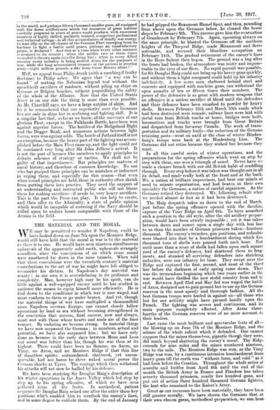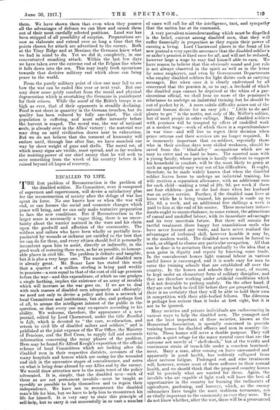THE MATERIAL AND THE MORAL.
WE may be permitted to wonder if Napoleon, could he have looked down on June 7th upon the Messines Ridge, would still have held that the moral in war is to the material as three is to one. He would have seen nineteen simultaneous upheavals of the apparently solid earth, upheavals strangely soundless, since the concussions of air which cause sound were smothered far down in the mine tunnels. When told that these convulsions were the twentieth century's material contributions to the art of war he might have felt obliged to reconsider his dictum. In Napoleon's day material was scanty ; in our own it is overwhelming in its profusion and complexity. Man, however high may be his spirit, can do little against a well-equipped enemy until he has studied in patience the means to equip himself more efficiently. He is tied down to the conditions in which war is now waged, and must conform to them or go under beaten. And yet, though the material things of war have multiplied a thousandfold since Napoleon overran Europe, one cannot closely follow operations by land or sea without becoming strengthened in the conviction that success, final success, now and always, must rest with those whose hearts and souls are of the -finer temper. By enduring we become strong. In material things we have now surpassed the German ; in numbers, actual and potential, we have also surpassed him ; but we have only done so because in the early days between Mons and Loos our moral was loftier than his, though his was then at its highest. There could have been no Somme, no Ancre, no Vimy, no Arms, and no Messines Ridge if that thin line of dauntless spirits, outnumbered, shattered, yet uncon- querable, had not borne by sheer naked moral power the German shocks at Ypres. The courage which then withstood his attacks will not now be baffled byhis defence.
We have been studying Sir Douglas Haig's description of his winter operations in the Ancre Valley which led step by step up to his spring offensive, of which we have seen gathered some of the fruits. In methodical, patient sequence Sir Douglas Haig seized one after the other those key positions which enabled bim to overlook the enemy's lines, and in some degree to enfilade them. By the end of January he had gripped the Beaumont Hamel Spur, and then, pounding from above upon the Germans below, he cleared the lower slopes by February tth. This success gave him the evacuation of Grandcourt by February 7th. Again, operating always on the same principle, he blasted the Germans off the northern heights of the Thiepval Ridge, made Miraumont and Serre untenable, and seoured their bloodless occupation on February 24th. The gradual retirement of the enemy's lines in the Roye Salient then began. The ground was a bog after the frosts had broken, the atmosphere was misty and impene- trable to the eyes of our fliers. No rapid pursuit was possible, for Sir Douglas Haig could not bring up his heavy gums quickly, and without them a light rearguard could hold up his infantry indefinitely. A few score men, sheltered behind steel and concrete and -equipped with machine guns, can withstand the open assaults of ten or fifteen times their numbers. 'The power of the defensive is so great with modern weapons that an offensive is a useless sacrifice of blood until the defenders and their defences have been smashed to powder by heavy shells. Between February 25th and March 10th roads which had been destroyed were remade, railway lines were laid with metal torn from British tracks at home, bridges were built, locomotives and trucks were brought from Great Britain and despatched from far-away Canada. The work of trans- portation and its military fruits—the reduction of the German retaining posts—went on until at the close of winter Hinden- burg's troops were back at the Hindenburg Line. Tho Germans did not retire because they wished but because they must.
In all this careful series of winter operations, and the preparations for the spring offensive which went on step by step with them, one sees a triumph of moral. Never have we made a cleaner breach with our old British habit of muddling through. Every step before it was taken was thought uut in all its detail, and made really both at the front and at the back. We, a nation of brilliant improvisers, had bent our minds at need to minute organization, -and had beaten at their own speciality the Germans, a nation of careful organizers. As the Germans retired they destroyed. We, following, rebuilt what we needed almost as fast as it had been destroyed.
The Haig despatch takes us down to the end of March, just before the spring offensive opened with the dazzling capture of the Vimy Ridge on April 6th. To have assaulted such a position in the old style, after the old artillery prepar- ation, would have been utterly impossible ; yet it was taken between dawn and sunset upon a single day with less loss to us than the number of German prisoners taken—fourteen thousand. The enemy's trenches, gun positions, and redoubts were blasted into dust by a bombardment during which five thousand tons of shells were poured forth each hour. Not until more than a score of shells had fallen upon each square yard of the enemy's defences, had shattered them to frag- ments, and stunned all surviving defenders into shrieking imbeciles, were our infantry let loose. They swept over the Ridge and captured the first, second, and most of the third line before the darkness of early spring came down. 'That was the -tremendous beginning which two years earlier in the war would have thrilled the now stolid country from end ta end. Between April 23rd and May 3rd was waged the battle of Arras, designed not to gain ground but to use up the Germane reserves in the most speedy and thorough fashion. All tits best German troops were hurled in against us—all those who but for our activity might have pressed hardly upon the French. The fighting was severe and continuous, and its main purpose completely effected. After Arras three- fourths of the German reserves were of no more account to their leaders.
Last came the most brilliant and spectacular feats of all— the blowing up on June 7th of the Messines Ridge, .and the seizure of the whole salient which it defended. One cannot suppose that the mines themselves, gigantic though they were, did much beyond shattering the enemy's moral. The Ridga extends for nine miles and the mines numbered nineteen, two to the mile. The Messines Ridge was won, as the Vimy Ridge was won, by a .continuous intensive bombardment from heavy guns till the earth was " without form, and void " as it had been before the 'Creation. Throughout the whole series of assaults and battles from April 6th until the end. of this month the British Army in France and Flanders has taken seventy thousand prisoners, nearly five hundred guns, and put out of action three hundred thousand German fighters, the best who remained to the Kaiser's Army.
Great as our successes have been materially, they have been still greater -morally. We have shown the Germans that at their own chosen game, methodical preparation, we san beat Ahem. We have shown them that even when they possess all the advantages of defence we can blow and smash them out of their most carefully selected positions. Land war has been stripped of all possibility of surprise. Preparations are now so elaborate and extend over so- Long a time that the points chosen for attack are advertised to the enemy. Both at the Vimy Ridge and at Messines the Germans knew what we had in mind to do. Yet we did it, completely, in one concentrated smashing attack. Within the last few days we have taken over the extreme end of the Belgian line where it falls down into the sea. This may imply fresh operations towards that decisive military end which alone can bring peace to the world.
From the purely military point of view one may fail to see how the war can be ended this year or next year. But one may draw some grisly comfort from the moral and physical degeneration which is overtaking the Germans in punishment for their crimes. While the moral of the British troops is as high as ever, that of their opponents is steadily declining. Food is not short in quantity in the German trenches, but its quality has been reduced by fully one-third. The civil population is suffering, and must suffer intensely before the harvest is reaped. The moral war, the war of national souls, is already over in the Allies' victory ; the material war may drag on until civilization draws near to exhaustion. But we do not believe that the torment of humanity will endure until, through line after line, we have smashed our way by sheer weight of guns and shells. The moral rot, of which many signs are visible, must spread, and so far weaken the resisting-power of our chief enemy that he will seek to save something from the wreck of his country before it is ruined beyond all hopes of recovery.



































 Previous page
Previous page